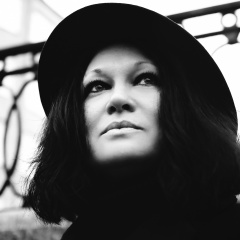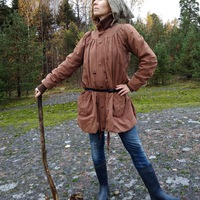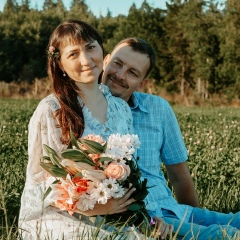Сегодня праздник, но часть души занята беспокойством. Я всё чаще — оттого ли, что мой круг общения расширился в определённую сторону — могу видеть, как люди дистанцируются от этого праздника или вовсе воспринимают его как инструмент пропаганды, как средство, с помощью которого государство пытается "цементировать общество". Безусловно, я бы не хотел, чтобы меня с кем бы то ни было цементировали. Но для меня, по счастью, и День Победы начинается не с государства, а с прямо противоположного конца: с семьи.
Я говорю "по счастью", потому что не каждый в моём поколении застал двух дедушек-фронтовиков живыми. Я поздний ребёнок, поэтому именно дедов, а не прадедов. Короткая дистанция: один из них (мамин отец) был рядом всё моё детство ("I love my grandfather most of all" сообщало моё сочинение по английскому). В День Победы он и был для меня, как я понимаю сейчас, главной сутью и присутствием праздника: встретить его, нарядного, в костюме с медалями, неспешно пройтись по городу и прийти домой к застолью. Собственно о войне дедушка рассказывал мало, больше смешное (например, как ещё в учебке он, впервые попав в столовую, заслушался — там из репродукторов играл "джаз, Утёсов" — а у него тем временем утащили его порцию), но, сажая меня к себе на колени, показывал медали. "За отвагу" ему вручили за то, что их артиллерийский расчёт уничтожил прямой наводкой танк "Пантера". Ещё медаль "За боевые заслуги", "За взятие Кёнигсберга", "Za Odre-Nyse-Baltyk" — это медаль польская, от польского командования. Орден Отечественной войны II степени.
О другом рассказывала бабушка: об эвакуации на Урал, о том, как "снимали с поезда" знакомых, которых везли эшелонами дальше в тыл, и селили у себя, о том, как её мать месяц не могла отдать похоронку той, кому она была адресована. Я не знаю войны, но я знаю их живую память о ней и их живое отношение к Победе. День Победы — их праздник, но это не значит, что сегодня, когда их нет в живых, мне нечего праздновать: он во мне, я не могу иначе.
Именно так: праздновать. Я угадываю тенденцию относиться к 9 мая исключительно как ко дню скорби, памяти о жертвах войны. Несомненно, и для меня в первом ряду стоят скорбь и память. Но это память не только о жертвах — ещё и о подвиге. Слова много значат. Жертва — сложное слово. О жертве можно говорить, не уточняя субъекта: жертва фашизма или жертва сталинизма — кто разберёт? И жертва может быть случайной, не во имя чего-то. Подвиг — "героический, самоотверженный поступок", говорит Ожегов. А поступок имеет цель и результат. Советский народ защитил себя, свою землю и свою культуру, вместе с союзниками он уничтожил гитлеровский фашизм. Этот коллективный поступок, напряжение, самозабвение, готовнсть идти на смерть, которых он потребовал, даёт мне повод праздновать то, что на свете нашлись такие люди и что это мой народ. Я горжусь ими, я хотел бы на них равняться. И я рад, что они достигли этой своей цели.
Мы всегда смотрели трансляцию Парада, и сегодня я, хотя бы частично, смотрел. Это часть нашего, а значит и моего, праздника. Заявления, что это "бряцанье оружием" и "демонстрация силы", переводящие его в сиюминутную политическую плосксть, для меня не работают: это парад в ознаменование Победы, а не в честь Путина или кого бы то ни было. А в сегодняшней речи Путина на параде не было ничего, с чем бы я не хотел согласиться.
Так что я не разделяю отношения тех, кто возмущается проведением Парада, будь он с техникой и авиацией или без. Но я полностью разделяю возмущение и негодование чудовищным качеством производимой сегодня ко Дню Победы "патриотической" продукции. Пустые, штампованные фильмы о войне, песни (очередная бездарная песня про "Бессмертный полк" сегодня из колонок на Софийской площади в Новгороде) — бюджетные средства выделены и отработаны бездарностями. И я вполне могу понять, что у многих именно сегоднящняя медийная инкарнация 9 мая вызывает эстетическое отторжение от этого праздника. Что с этим делать и чем это кончится я не знаю. Но даже среди этого мусора меня настигли сегодня два выдающихся произведения искусства, которые удовлетворят любую искушённость в вопросах формы: фильм "Был месяц май" Хуциева и рассказ Платонова "Дерево Родины". Одна из традиций понимания задачи искусства — "представлять непредставимое". Сегодня, когда поколение ветеранов почти ушло, только искусство, созданное этим поколением, может сообщить нам, как сказал президент, "дух и смысл" Победы.
Я говорю "по счастью", потому что не каждый в моём поколении застал двух дедушек-фронтовиков живыми. Я поздний ребёнок, поэтому именно дедов, а не прадедов. Короткая дистанция: один из них (мамин отец) был рядом всё моё детство ("I love my grandfather most of all" сообщало моё сочинение по английскому). В День Победы он и был для меня, как я понимаю сейчас, главной сутью и присутствием праздника: встретить его, нарядного, в костюме с медалями, неспешно пройтись по городу и прийти домой к застолью. Собственно о войне дедушка рассказывал мало, больше смешное (например, как ещё в учебке он, впервые попав в столовую, заслушался — там из репродукторов играл "джаз, Утёсов" — а у него тем временем утащили его порцию), но, сажая меня к себе на колени, показывал медали. "За отвагу" ему вручили за то, что их артиллерийский расчёт уничтожил прямой наводкой танк "Пантера". Ещё медаль "За боевые заслуги", "За взятие Кёнигсберга", "Za Odre-Nyse-Baltyk" — это медаль польская, от польского командования. Орден Отечественной войны II степени.
О другом рассказывала бабушка: об эвакуации на Урал, о том, как "снимали с поезда" знакомых, которых везли эшелонами дальше в тыл, и селили у себя, о том, как её мать месяц не могла отдать похоронку той, кому она была адресована. Я не знаю войны, но я знаю их живую память о ней и их живое отношение к Победе. День Победы — их праздник, но это не значит, что сегодня, когда их нет в живых, мне нечего праздновать: он во мне, я не могу иначе.
Именно так: праздновать. Я угадываю тенденцию относиться к 9 мая исключительно как ко дню скорби, памяти о жертвах войны. Несомненно, и для меня в первом ряду стоят скорбь и память. Но это память не только о жертвах — ещё и о подвиге. Слова много значат. Жертва — сложное слово. О жертве можно говорить, не уточняя субъекта: жертва фашизма или жертва сталинизма — кто разберёт? И жертва может быть случайной, не во имя чего-то. Подвиг — "героический, самоотверженный поступок", говорит Ожегов. А поступок имеет цель и результат. Советский народ защитил себя, свою землю и свою культуру, вместе с союзниками он уничтожил гитлеровский фашизм. Этот коллективный поступок, напряжение, самозабвение, готовнсть идти на смерть, которых он потребовал, даёт мне повод праздновать то, что на свете нашлись такие люди и что это мой народ. Я горжусь ими, я хотел бы на них равняться. И я рад, что они достигли этой своей цели.
Мы всегда смотрели трансляцию Парада, и сегодня я, хотя бы частично, смотрел. Это часть нашего, а значит и моего, праздника. Заявления, что это "бряцанье оружием" и "демонстрация силы", переводящие его в сиюминутную политическую плосксть, для меня не работают: это парад в ознаменование Победы, а не в честь Путина или кого бы то ни было. А в сегодняшней речи Путина на параде не было ничего, с чем бы я не хотел согласиться.
Так что я не разделяю отношения тех, кто возмущается проведением Парада, будь он с техникой и авиацией или без. Но я полностью разделяю возмущение и негодование чудовищным качеством производимой сегодня ко Дню Победы "патриотической" продукции. Пустые, штампованные фильмы о войне, песни (очередная бездарная песня про "Бессмертный полк" сегодня из колонок на Софийской площади в Новгороде) — бюджетные средства выделены и отработаны бездарностями. И я вполне могу понять, что у многих именно сегоднящняя медийная инкарнация 9 мая вызывает эстетическое отторжение от этого праздника. Что с этим делать и чем это кончится я не знаю. Но даже среди этого мусора меня настигли сегодня два выдающихся произведения искусства, которые удовлетворят любую искушённость в вопросах формы: фильм "Был месяц май" Хуциева и рассказ Платонова "Дерево Родины". Одна из традиций понимания задачи искусства — "представлять непредставимое". Сегодня, когда поколение ветеранов почти ушло, только искусство, созданное этим поколением, может сообщить нам, как сказал президент, "дух и смысл" Победы.
Today is a holiday, but part of the soul is busy with worry. More and more often - whether because my social circle has expanded in a certain direction - I can see how people distance themselves from this holiday or even perceive it as a propaganda tool, as a means by which the state is trying to "cement society". Of course, I would not want to be cemented with anyone else. But for me, fortunately, Victory Day begins not with the state, but with the opposite end: with the family.
I say “luckily,” because not everyone in my generation found two front-line grandfathers alive. I am a late child, therefore it is grandfathers, not great-grandfathers. Short distance: one of them (my mother's father) was by my side all my childhood ("I love my grandfather most of all" reported my essay in English). On Victory Day, he was for me, as I understand it now, the main essence and presence of the holiday: to meet him, smart, in a suit with medals, to walk slowly around the city and come home to the feast. Actually, my grandfather talked little about the war, more funny (for example, how in school he, when he first got into the dining room, listened - there was playing "jazz, on my knees, showing medals. "For courage" he was awarded for the fact that their artillery crew destroyed a Panther tank with direct fire. Another medal "For military service", "For the capture of Koenigsberg", "Za Odre-Nyse-Baltyk" is a Polish medal from the Polish command. Order of the Patriotic War II degree.
My grandmother talked about something else: about the evacuation to the Urals, about how acquaintances were "removed from the train", who were transported in trains further to the rear, and settled at her place, about how her mother could not give the funeral to the one to whom she was addressed for a month ... I do not know the war, but I know their vivid memory of it and their vivid attitude to Victory. Victory Day is their holiday, but this does not mean that today, when they are not alive, I have nothing to celebrate: it is in me, I cannot do otherwise.
That's right: celebrate. I can guess the tendency to treat May 9 exclusively as a day of mourning, a memory of the victims of the war. Undoubtedly, for me, sorrow and memory are in the first row. But this is not only a memory of the victims, but also of the feat. Words mean a lot. Victim is a complicated word. You can talk about a victim without specifying the subject: a victim of fascism or a victim of Stalinism - who will understand? And the sacrifice may be accidental, not in the name of something. A feat is "a heroic, selfless act," says Ozhegov. And an act has a goal and a result. The Soviet people defended themselves, their land and their culture, together with their allies, they destroyed Hitler's fascism. This collective act, tension, self-forgetfulness, willingness to go to death, which he demanded, gives me a reason to celebrate that such people were found in the world and that they are my people. I am proud of them, I would like to be equal to them. And I am glad that they achieved this goal.
We always watched the broadcast of the Parade, and today I did, at least partially. This is part of our, and therefore my, holiday. Statements that this is a "saber rattling" and "a demonstration of power", translating it into a momentary political plane, do not work for me: this is a parade to commemorate the Victory, and not in honor of Putin or anyone else. And there was nothing in Putin's speech at the parade today that I would not want to agree with.
So I do not share the attitude of those who are outraged by the holding of the Parade, be it with equipment and aircraft or without. But I fully share the indignation and indignation at the monstrous quality of the "patriotic" products produced today for Victory Day. Empty, stamped films about the war, songs (another mediocre song about the "Immortal Regiment" today from the columns on Sofia Square in Novgorod) - budget funds were allocated and worked out by mediocrity. And I can quite understand that for many it is precisely the today's media incarnation of May 9 that causes an aesthetic rejection of this holiday. What to do with this and how it will end, I do not know. But even among this rubbish I was overtaken today by two outstanding works of art that will satisfy any sophistication in matters of form: the film "There was a month in May" by Khutsiev and Platonov's story "The Tree of the Motherland". One of the traditions of understanding the task of art is "to represent the unimaginable." Today, when the generation of veterans is almost gone, only the art created by this generation can tell us, as the president said, "the spirit and meaning" of Victory.
I say “luckily,” because not everyone in my generation found two front-line grandfathers alive. I am a late child, therefore it is grandfathers, not great-grandfathers. Short distance: one of them (my mother's father) was by my side all my childhood ("I love my grandfather most of all" reported my essay in English). On Victory Day, he was for me, as I understand it now, the main essence and presence of the holiday: to meet him, smart, in a suit with medals, to walk slowly around the city and come home to the feast. Actually, my grandfather talked little about the war, more funny (for example, how in school he, when he first got into the dining room, listened - there was playing "jazz, on my knees, showing medals. "For courage" he was awarded for the fact that their artillery crew destroyed a Panther tank with direct fire. Another medal "For military service", "For the capture of Koenigsberg", "Za Odre-Nyse-Baltyk" is a Polish medal from the Polish command. Order of the Patriotic War II degree.
My grandmother talked about something else: about the evacuation to the Urals, about how acquaintances were "removed from the train", who were transported in trains further to the rear, and settled at her place, about how her mother could not give the funeral to the one to whom she was addressed for a month ... I do not know the war, but I know their vivid memory of it and their vivid attitude to Victory. Victory Day is their holiday, but this does not mean that today, when they are not alive, I have nothing to celebrate: it is in me, I cannot do otherwise.
That's right: celebrate. I can guess the tendency to treat May 9 exclusively as a day of mourning, a memory of the victims of the war. Undoubtedly, for me, sorrow and memory are in the first row. But this is not only a memory of the victims, but also of the feat. Words mean a lot. Victim is a complicated word. You can talk about a victim without specifying the subject: a victim of fascism or a victim of Stalinism - who will understand? And the sacrifice may be accidental, not in the name of something. A feat is "a heroic, selfless act," says Ozhegov. And an act has a goal and a result. The Soviet people defended themselves, their land and their culture, together with their allies, they destroyed Hitler's fascism. This collective act, tension, self-forgetfulness, willingness to go to death, which he demanded, gives me a reason to celebrate that such people were found in the world and that they are my people. I am proud of them, I would like to be equal to them. And I am glad that they achieved this goal.
We always watched the broadcast of the Parade, and today I did, at least partially. This is part of our, and therefore my, holiday. Statements that this is a "saber rattling" and "a demonstration of power", translating it into a momentary political plane, do not work for me: this is a parade to commemorate the Victory, and not in honor of Putin or anyone else. And there was nothing in Putin's speech at the parade today that I would not want to agree with.
So I do not share the attitude of those who are outraged by the holding of the Parade, be it with equipment and aircraft or without. But I fully share the indignation and indignation at the monstrous quality of the "patriotic" products produced today for Victory Day. Empty, stamped films about the war, songs (another mediocre song about the "Immortal Regiment" today from the columns on Sofia Square in Novgorod) - budget funds were allocated and worked out by mediocrity. And I can quite understand that for many it is precisely the today's media incarnation of May 9 that causes an aesthetic rejection of this holiday. What to do with this and how it will end, I do not know. But even among this rubbish I was overtaken today by two outstanding works of art that will satisfy any sophistication in matters of form: the film "There was a month in May" by Khutsiev and Platonov's story "The Tree of the Motherland". One of the traditions of understanding the task of art is "to represent the unimaginable." Today, when the generation of veterans is almost gone, only the art created by this generation can tell us, as the president said, "the spirit and meaning" of Victory.
У записи 21 лайков,
0 репостов,
238 просмотров.
0 репостов,
238 просмотров.
Эту запись оставил(а) на своей стене Илья Попов










































